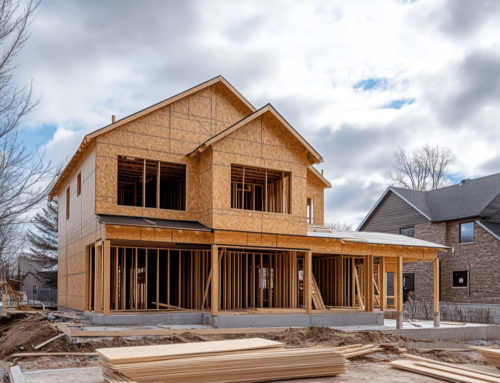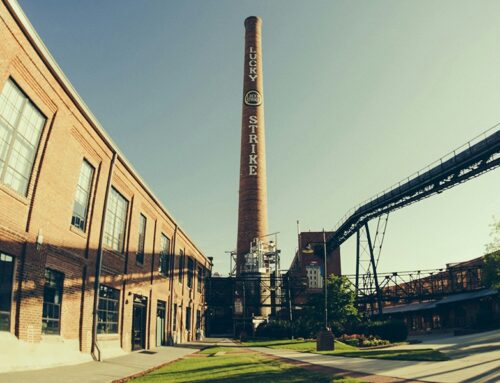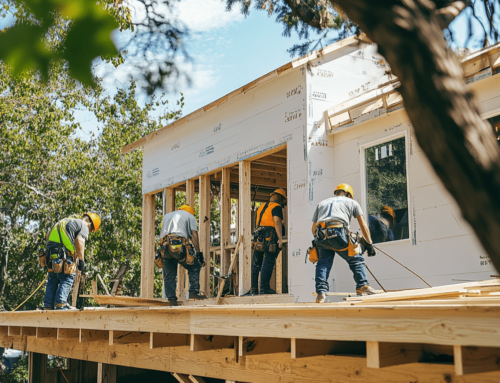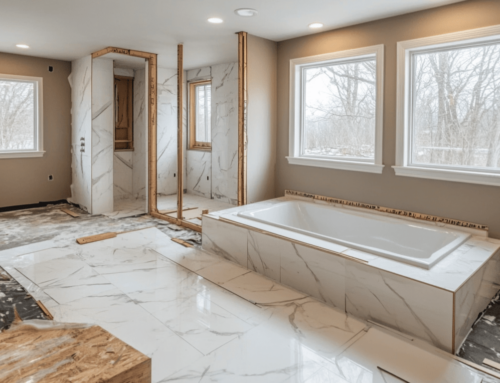Building an addition on your home is a good way to add space and function to it. In many cases, it can also increase your home’s value.
To help you determine whether a home addition is a worthwhile investment, we created this brief guide. You’ll learn about the different factors that contribute to the cost of building an addition, as well as how much value one can add to your property. We’ll also go over some of the other upsides of building on to your home.
How Much Does It Cost To Build an Addition On a House?
A home addition can cost as little as $20,000 to build and well over $100,000 on the high end. The reason for such a large range is that there are a ton of variables that go into the cost of an addition.
You can start to get a sense for the cost of your planned addition by multiplying the average cost per square foot for new construction in your area by the square footage of the addition. But be aware that the features and amenities you put in the addition can change that cost substantially, along with many other factors.
The only way to get a truly accurate idea of how much an addition will cost is to get a quote from a contractor. Still, knowing what goes into that cost will help you set expectations about your budget.
Home Addition Cost Factors
More than most projects, home additions tend to be custom jobs. Contractors must work with existing structures and utility infrastructure. They also have to take into consideration the specifics of your lot and work with local regulations.
In this section, we cover some of the key factors that contribute to the overall cost of building an addition. This may give you a better idea of what is realistic for you and your finances.
Home Addition Size
Like any construction project, builders price home additions on a per-square-foot basis — or at least set their base rates this way before adding on for other factors. That means that a large portion of the cost of an addition is based on how big it is.
The cost per square foot may go down as the footprint increases. This is because some of the quoted price includes costs related to starting and finishing the job, and not strictly how much material is used. Still, you can expect that the bigger the addition you build, the more you’ll pay for it.
Home Addition Features
Most people want more than an empty room for their addition. Going beyond the basic four walls, a floor, and a ceiling adds cost to your project.
For example, putting a bathroom in your addition starts at around $10,000 and can go much higher. You’ll have to pay more for features like a fireplace, skylights, countertops, or to divide it into separate rooms.
Building Materials
Another major factor in the price of an addition is the cost of materials used to build it. This includes structural materials like lumber, concrete, and roofing materials. It also includes infrastructure materials, such as wiring, plumbing, and HVAC.
You may not have much choice when it comes to these materials, but that changes when you get to materials used for interior and exterior finishing. There can be a wide range in price with materials like flooring, trim, moulding, surfaces, and even paint.
Using basic finishing materials can cost significantly less than opting for premium materials. However, cheaper materials aren’t likely to last as long as higher-quality ones. That means you may have to replace them much sooner, negating the original cost savings.
Site Work
Site specifications for your property also play a role in the cost of building an addition. If your lot is relatively flat with lots of space and easy to get materials in and out of, you may not need much work on it to build.

However, if the lot requires significant work such as grading, getting it ready to build can be expensive. That’s also true if aspects of your lot make it difficult for the builder, such as limited access to the site that make it a challenge to get materials and equipment in and out.
Local Labor Rates
Building an addition requires a team of skilled workers. How much these workers get paid is subject to the standard rates for your local market.
If you live in a high cost of living area, you can expect hourly labor rates to be higher than other parts of the state. Even small differences in hourly rates can have a big impact on the final bill, since you’re multiplying that difference by the hours worked and number of workers.
Utility Connections
Unless you don’t want water, electricity, heating, or air conditioning in your new addition, you’ll have to build the infrastructure for those utilities in. Just like with a new home or a remodel, this is a major expense.
In addition, that infrastructure will need to be connected to the sources that feed them. Whether that’s your own septic line and well or municipal sewer lines, your site may require significant work to connect the new utility lines to them.
Permits
Local building permits are a minor expense compared to material and labor costs, but they’re still a factor. Depending on where you live in North Carolina, permits may be priced at a set rate or by the square foot. They typically cost a few hundred dollars.
However, there are also other administrative costs in many cases. This can include getting an official inspection from your local authority or local zoning fees.
Home Addition Financing
Unless you can pay for your addition in cash, you’ll need to find financing to build it. Many people fail to consider the additional cost of paying interest on a loan.
Just how much interest you’ll pay depends on the cost of the addition and the interest rate you get for your loan. Interest rates are highly variable. They depend on the type of loan you get and can fluctuate at a moment’s notice.
How Much Value Does a Home Addition Add?
According to Credit Karma, adding a primary suite to your home as an addition can give you about a 30% return on investment (ROI). That means that if you spend $100,000 to add a new suite to your home, it may add around $130,000 to the overall value.
This, however, is highly variable. Factors such as local home values, market conditions, the quality and functionality of your addition, and more all contribute to the value it can add to your home.
An experienced real estate agent who is knowledgeable of your area may be able to give you a general idea of what kind of ROI your addition can provide.
Other Benefits of Building an Addition
Adding space to your home has value beyond simply the price you can sell it for. There are a few other significant upsides to building an addition that should factor into your decision.
More Space
There are a lot of reasons you may want more space. Perhaps you are expecting to welcome a new member to your family and need a nursery. You may have a family member or other loved one in need of care that you want close by.
Or, maybe you just want more space for the sake of having more space. Whatever the reason, an addition gives you additional space that can improve the enjoyment of your home.
More Functionality
Building an addition can also enable you to use your home in new ways. For example, you may want to build an office if you work from home or run a business from it. An addition can also be the perfect place for a home gym or exercise studio.
Adding another space to your home gives you the opportunity to make it more useful. It can also help you better tune your living space to how you live your life.
More Appeal to Buyers
Another benefit of an addition is how much more attractive it can make your home to potential buyers when you do sell it. Especially if your current home is on the smaller side, adding more rooms to it enables it to become an option for buyers with more space needs and bigger families.
Your current home may be limited to a small group of buyers due to its size and configuration. Making it larger and adding more functional space to it can open it up to entirely new markets and help it sell faster.
Building a Home Addition: Is It Worth It?
For many homeowners, building an addition can be a worthwhile investment for both financial reasons and less tangible ones. But whether an addition is worth the money you spend on it depends on a lot of different things.
The biggest consideration for most people is the ROI of building their addition. There is no certainty when it comes to predicting that, but a real estate agent and your contractor can provide insight.
You should also consider the other ways in which an addition can provide value for your life. If you love your current home due to the location or for sentimental reasons, building on to it can allow you to accommodate your changing needs while staying in a place that makes you happy. That’s hard to put a price tag on.





